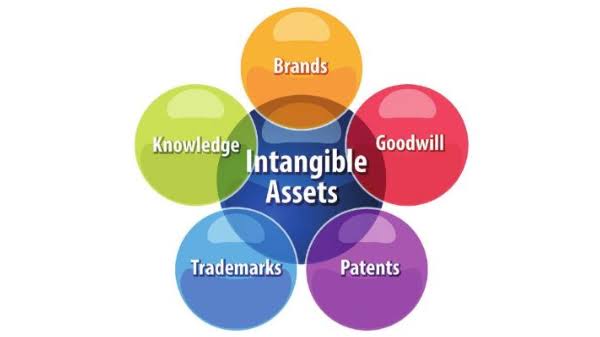 |
Intangible assets a company can have | Image: producebluebook.com |
The image above shows intangible assets a good business/brand could and should have. But we'd be focusing more on Brands and Goodwill—the two most confusing—thoroughly bringing their differences and similarities down to the layman's language, not the usual business margins you hear. In simple terms, the main difference between the two is that Goodwill is earned while Brand is owned.
A brand is basically a sign, word, or symbol used to distinguish a product or service from its competitors.
Goodwill, on the other hand, is the reputation earned by a company. You can't just earn goodwill in one or two days. Establishing your credibility in an overpopulated market takes time.
Let me explain more adeptly with their differences and similarities.
{tocify} $title={Table of Contents}
Differences and Similarities between Brand Equity and Goodwill
Brand Equity
 |
| Components of brand equity | Image: iclass.ng |
Low-quality products result in negative brand equity. Customers are not satisfied with the services, and they give negative reviews on different platforms. These reviews describe the equity of the brand to other customers. Therefore, brand equity directly depends on the customer's view of the brand. Brands can also influence or change these views with an excellent quality service or product.
There are several factors to consider when discussing brand equity. These factors include economic effect, perception of quality, and the value of a brand. In any situation, the customer has the final say.
Often, brands update their business to stay in the loop and not become outdated. By updating their products or services, brands get benefits in sales. These benefits are gained by equity. Popular brands build their equity by providing quality products. The high quality justifies the high cost of the product. People buy these products despite the high price because they trust the brand’s equity.
Since brand equity is an integral part of building a business, marketing agencies are essential. Marketing agencies provide many companies with a marketing strategy best suited to the needs of that business. With high competition in the market and ever-changing trends, having an effective marketing strategy can help any company in the longer run.
Brand equity can make or break a business. Companies with higher brand equity can charge a higher price. They can have more market shares and value than a newly established business.
Goodwill
 |
| Goodwill | Image: blog.cfainstitute.org |
Sometimes, goodwill can be the deeper connection between a customer and a company. This connection works as a bridge between both sides. With time customers start to perceive them as a family instead of a business.
Brand goodwill provides the general value of a brand compared to equity which tells the success of a brand. Goodwill can be determined by conducting a financial analysis, and then the results can be compared to the competitor's performance to evaluate the net value.
A good example is Nigeria's e-Naira Speed wallet app which was removed from Google PlayStore in its first week due to bad reviews. That is a clear depiction of Brand Equity. The Goodwill of the service has not been determined yet because it is relatively new.
Brand equity and goodwill are two entirely different concepts, but both play a significant role in the growth of a company. You can revive a company by focusing on its equity and goodwill. An excellent marketing strategy will help you with that. So the basic conclusion is that companies own brand equity, but the goodwill is a reward for all the hard work and high-quality services that the company has provided to its customers.
